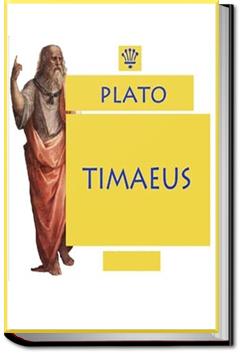UNLIMITED Audiobooks and eBooks
Over 40,000 books & works on all major devices
Get ALL YOU CAN for FREE for 30 days!
Timaeus
Plato
Book Overview:
‘Timaeus’ is usually regarded as one of Plato’s later dialogues, and provides an account of the creation of the universe, with physical, metaphysical and ethical dimensions, which had great influence over philosophers for centuries following. It attributes the order and beauty of the universe to a benevolent demiurge – a ‘craftsman’ or god – fashioning the physical world after the pattern of an ideal, eternal one.
The dramatic setting of the dialogue is the day after a discussion in which Socrates has described his ideal state – as in the ‘Republic’. A conversation between Socrates, Critias, Hermocrates and Timaeus, including Critias’ account of Solon’s journey to Egypt (where he hears the story of Atlantis), soon gives way to the monologue by Timaeus that forms the bulk of the work.
‘Timaeus’ is usually regarded as one of Plato’s later dialogues, and provides an account of the creation of the universe, with physical, metaphysical and ethical dimensions, which had great influence over philosophers for centuries following. It attributes the order and beauty of the universe to a benevolent demiurge – a ‘craftsman’ or god – fashioning the physical world after the pattern of an ideal, eternal one.
The dramatic setting of the dialogue is the day after a discussion in which Socrates has described his ideal state – as in the ‘Republic’. A conversation between Socrates, Critias, Hermocrates and Timaeus, including Critias’ account of Solon’s journey to Egypt (where he hears the story of Atlantis), soon gives way to the monologue by Timaeus that forms the bulk of the work.
How does All You Can Books work?
All You Can Books gives you UNLIMITED access to over 40,000 Audiobooks, eBooks, and Foreign Language courses. Download as many audiobooks, ebooks, language audio courses, and language e-workbooks as you want during the FREE trial and it's all yours to keep even if you cancel during the FREE trial. The service works on any major device including computers, smartphones, music players, e-readers, and tablets. You can try the service for FREE for 30 days then it's just $19.99 per month after that. So for the price everyone else charges for just 1 book, we offer you UNLIMITED audio books, e-books and language courses to download and enjoy as you please. No restrictions.
The process of repletion and depletion is produced by the attraction of like to like, after the manner of the universal motion. The external elements by their attraction are always diminishing the substance of the body: the particles of blood, too, formed out of the newly digested food, are attracted towards kindred elements within the body and so fill up the void. When more is taken away than flows in, then we decay; and when less, we grow and increase.
The young of every animal has the triangles new and closely locked together, . . . Read More
Try now for FREE!

"Love your service - thanks so much for what you do!"
- Customer Cathryn Mazer
"I did not realize that you would have so many audio books I would enjoy"
- Customer Sharon Morrison
"For all my fellow Audio Book & E-Book regulars:
This is about as close to nirvana as I have found!"
- Twitter post from @bobbyekat



Community Reviews
Plato's Timaeus is a cornerstone of ancient philosophy, blending metaphysics with proto-scientific inquiry. This dialogue explores the creation of the world, the nature of the Gods, and the human body. Its rich tapestry has inspired thinkers and creators for millennia.
Theories on World Creation and
The book opens with a brief dialog between Socrates, Timaeus, Hermocrates, and Critias, which swiftly retrogrades into a long monologue by Timaeus himself, during which time Socrates sits quietly and listens.
Timaeus, from Locri, Italy, is a fictional character and his monologue is in fact Plato's le
1) Da, Atlantida. Kritija se seća detinjst(a)va. (59)
2) Kosmos je najlepši od svega što je postalo (68), a Tvorac je dobar, sve postoji postoji da bi ličilo njemu samom i kosmos je živo biće obdareno dušom i umom. (70)
3) Noć i dan su stvoreni da bi postojala neka vidljiva mera za odnos sporosti i br
The universe and souls and our bodies and geometry.
Socrates and Science
15 December 2018 – Perth
This book is famous for all the wrong reasons, and it basically has something to do with a city that for some reason Jason Moma seems to have a very strong connection to. Yet, while this is generally known as the Atlantis dialogue, in reality it isn’t, th
The sources for the myth of Atlantis are two: Plato's dialogs Timaeus and Critias, primarily the latter. That's it. The rest is much more modern invention.
Cornford's Plato books are usually detailed and excellent, albeit perhaps too detailed and technical for some readers. In this edition he did the
رسالهٔ تيمائوس، خلاصهايست از جهانبينى افلاطون، كه حاوى بخش ابتدايى اسطورهاى، بخش كوچكى در فلسفه و بخش بزرگى در طبيعيات است. بخش فلسفى مخصوصاً به دليل طرح مباحثى كه بعداً توسط ارسطو تكميل شد و به صورت نظريهٔ معروف صورت و ماده درآمد اهميت دارد. بخش اسطورهای بعدها توسط نوافلاطونیها، گنوسیها و مان